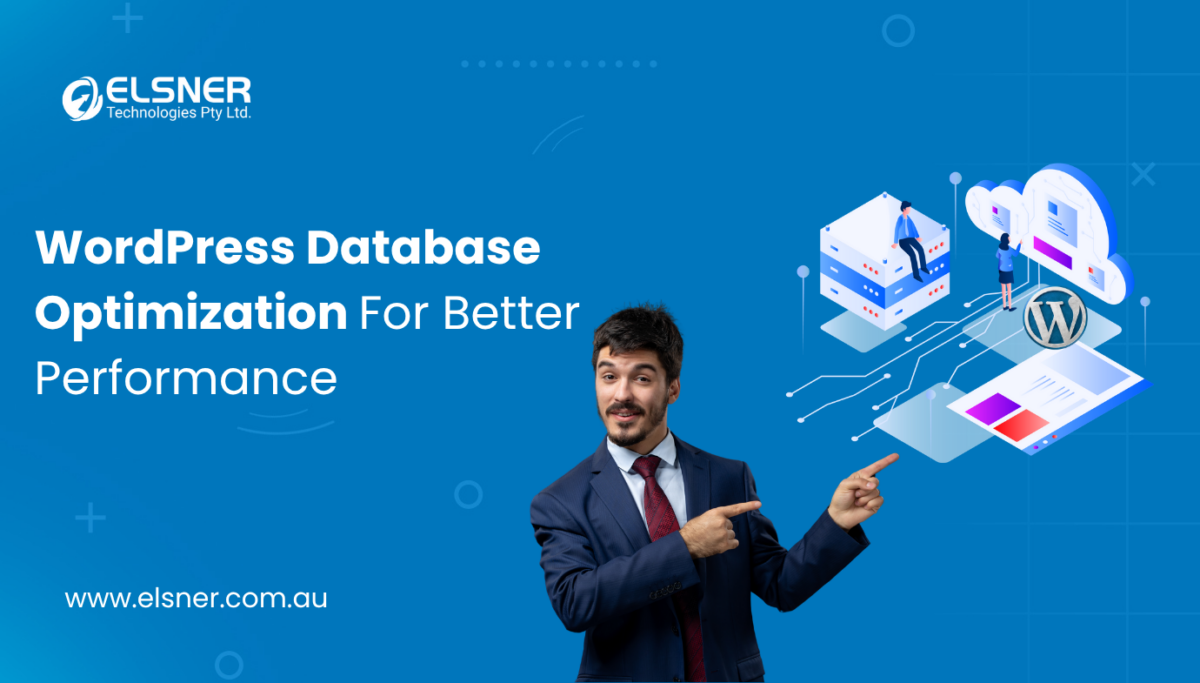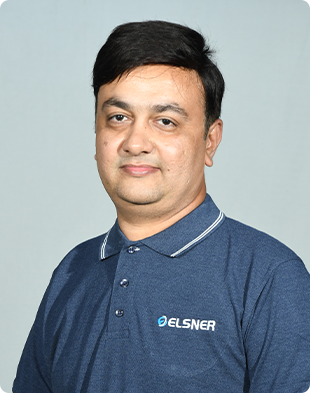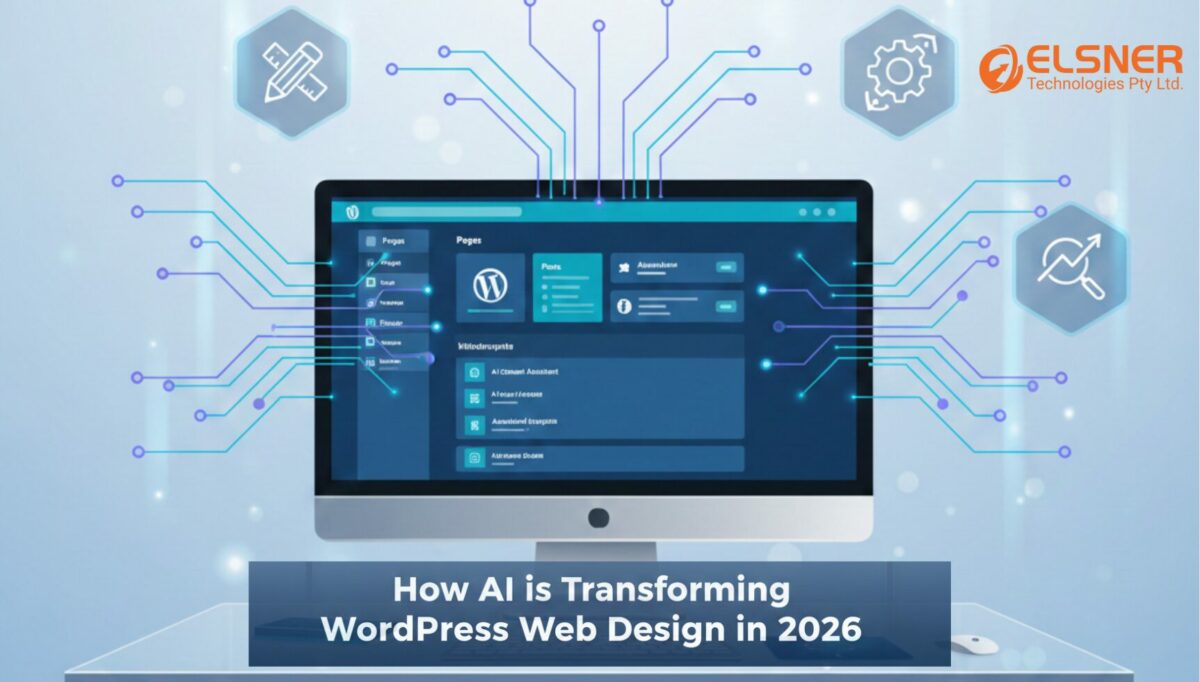WordPress Database Optimization: Backend Development for Better Performance
WordPressAn attractive website can stop people in their tracks. But a slow site sends them running. Your WordPress site design needs to look great on the outside and roar on the inside. That inside roar is based on one thing more than any other: your database.
In this article, we will provide a detailed guide on how to optimise your WordPress database for maximum speed and reliability. We will discuss each step, from simple cleanup to sophisticated caching, and illustrate how an affordable WordPress development company like Elsner Technologies can do the heavy work.
If you are looking for a WordPress developer in Sydney, Melbourne, or any other location, this guide will help you make the right choices.
1. The Hidden Engine: Why Your Database Matters
Your database drives content delivery on your site. Any page load initiates numerous database queries. Posts, pages, comments, plugin options—everything resides in MySQL or MariaDB tables.
With time, that database may slow down:
- Post revisions pile up.
- Spam and trashed comments take up space.
- Expired transients pile up.
- Unused tables linger on after plugin deletion.
Every unnecessary record slows queries, which means long load times. Long load times are lethal to conversions. A one-second page response delay can decrease conversions by as much as 20% (Source: Think with Google).
Good design is just half the equation, and backend performance is the other half.
2. Identifying Database Bloat
You need to measure before you optimise. Query Monitor and phpMyAdmin expose table sizes and query durations. Look for:
- Tables over 100 MB.
- Long “SELECT” queries that take over 0.5 s.
- Large numbers of autoloaded options.
Common culprits include:
- Post Revisions – Unlimited by default.
- Orphaned Metadata – Cache for posts and users that have been deleted.
- Plugin Artifacts – Tables left behind from disabled plugins.
- Expired Transients – Cached information that fails to expire properly.
A clean database always runs faster.
3. Essential Cleanup Steps
3.1 Backup First
Never change anything without a backup. Use UpdraftPlus, BlogVault, or server snapshots.
3.2 Delete Post Revisions
Limit revisions in wp-config.php:
Then delete excess revisions:
3.3 Empty Spam and Trash
Empty out your trash and spam folders in your admin area. Or run:
After backing up.
3.4 Remove Expired Transients
Expired transients are clutter. Clean them up with a plugin like Advanced Database Cleaner or run:
3.5 Remove Orphaned Metadata
Orphaned meta hurts joins. Clean it out with WP-Sweep or queries:
4. Automating Cleanup
This sounds perilous to do by hand. Instead, set up routine cleanups:
- Weekly – Remove revisions, trash, and transients.
- Monthly – Optimise tables.
Plugins like WP-Optimise can automate this. They do their work behind the scenes. You decide the timing.
5. Optimising Database Tables
After cleaning the data, the tables must still be optimised. In phpMyAdmin, select all tables and click “Optimise table.”
This rebuilds indexes. It defragments storage. You can also execute:
Frequent Optimization keeps performance stable.
6. Utilising Object Caching
Object caching keeps query outcomes cached in memory. Redis and Memcached are two widely used options. An Affordable WordPress Development Company can set these up for better performance.
Setup procedure:
- Install Redis or Memcached on your server.
- Add a drop-in file, such as object-cache.php, to wp-content/.
- Install a plugin like Redis Object Cache.
- Track cache hits compared to misses.
With caching, repeated queries are delivered from memory. Pages load in milliseconds.
7. Using a Content Delivery Network (CDN)
A CDN serves static assets—such as images, CSS, and JS—from servers located all over the world. It removes traffic from your origin server, resulting in reduced database and PHP load.
Pair a CDN with your optimised database. The outcome? A speedy, scalable website.
8. Managing Large Data Sets
E-commerce and membership sites frequently have large data sets. WooCommerce stores orders and customer information in custom tables.
Best practices:
- Store old orders in a different database.
- Split large tables by year or status.
- Use custom queries for reporting instead of relying on admin screens.
This keeps core tables slim. Queries remain quick.
9. Advanced Query Optimization
A mature WordPress website developer can create custom SQL to substitute slow WP_Query calls. They can:
- Employ direct joins to retrieve only the necessary fields.
- Insert indexes on the most-searched columns.
- Avoid SELECT * queries.
As an illustration, replace:
With a custom query that takes advantage of an appropriate index on meta_key:
10. How to Choose the Right Hosting
No level of Optimization addresses a poor host. WordPress development Sydney and Melbourne tends to opt for managed WordPress hosting. A good WordPress development company provides:
- Built-in caching
- Automatic backups
- Server-level optimizations
11. Monitoring Performance
Following Optimization, monitor metrics. Tools that you can utilise:
- New Relic – Server and app monitoring.
- GTmetrix – Page speed tests.
- Google PageSpeed Insights – Mobile and desktop scores.
- Query Monitor – Pinpoint slow queries in real time.
Set slow query or high CPU alerting.
12. Working with a Professional Team
Optimising databases without help can be dangerous. An experienced WordPress development company knows:
- How to safely audit live sites.
- What cleanup operations can be automated?
- When to author custom backend code.
- How to set up caching and hosting.
If you have to hire WordPress developer with expertise, seek out:
- Proven track record of performance tuning.
- Experience with Redis, Memcached, and CDNs.
- Custom SQL and plugin development capabilities.
- Good communication about progress and risks.
Elsner Technologies provides end-to-end solutions. From WordPress website design Sydney to backend engineering and Ongoing WordPress Maintenance, they tailor it all to your needs.
13. Local Expertise: Sydney & Melbourne
Sydney and Melbourne businesses battle fierce competition. Quick sites capture clicks and customers. Regional experts understand local hosting options and compliance regulations.
Employing a WordPress developer Sydney or a WordPress developer Melbourne yields advantages:
- Onshore support and communication.
- Local market trend knowledge.
- Access to local data centres.
14. Putting It All Together: Your Action Plan
- Audit – Measure table sizes, query times, and autoloaded options.
- Cleanup – Remove revisions, spam, transients, and orphaned metadata.
- Optimise Tables – Run OPTIMIZE TABLE regularly.
- Reduce Autoload – Tackle heavy autoloaded options.
- Cache – Implement Redis or Memcached.
- Host – Choose managed WordPress hosting.
- Monitor – Use New Relic, GTmetrix, and Query Monitor.
- Iterate – Repeat cleanups and audits on a quarterly basis.
15. Don’t Ignore Plugin Bloat
One of the most common reasons for WordPress performance issues, particularly database issues, is plugin saturation. Many site owners install hundreds of plugins, the majority of which touch the database in some manner. It isn’t necessarily the quantity, though, that’s the problem.
Poorly written code is part of the problem. Plugins that use inefficient queries or create unnecessary database tables. Others load data when they’re not even active.
Best practices to adopt:
- Audit plugins regularly. Uninstall those that you do not require.
- Swap redundant plugins for multi-purpose solutions.
- Steer clear of plugins that save too much metadata or transients.
- Deactivate plugin functions that you do not require. Enabled modules can still load queries.
Utilise tools such as Query Monitor or P3 Profiler to determine slow-performing plugins. Agencies experienced in WordPress development, like your WordPress Sydney developer team, can guide you to use light alternatives or create custom code to prevent dependency on bloated plugins.
16. Types of Personalised Posts and Taxonomies
If your site employs custom post types (CPTs) or sophisticated taxonomies, Optimization is even more vital. Each CPT contributes to the size and sophistication of wp_posts, wp_postmeta, and associated tables.
To effectively control CPTs:
- Do not overload postmeta. Cache big chunks of data into custom tables.
- Use get_posts() with stringent meta_query criteria.
- Install custom database indexes where appropriate.
- For taxonomy-dense configurations (directories, classifieds), use scalable taxonomy plugins or custom queries.
This is something that a skilled WordPress web developer can code to improve load times significantly.
17. User Data Management
Membership sites, online stores, and Learning Management System (LMS) sites, such as LearnDash, hold vast amounts of user data. That includes:
- Login history
- Profile metadata
- Orders and transactions
- Subscription records
This all builds up in wp_users and wp_usermeta, which can end up bloated over time.
Optimization steps for user data:
- Archive or purge inactive user accounts periodically.
- Compress or offload logs.
- Restrict usermeta to only necessary details.
- Index frequently accessed fields such as user_email and custom roles.
Hire WordPress developer who knows how to tackle user-based performance issues. An Affordable WordPress Development Company can improve how WordPress performs authentication, permissions, and role-based access control.
18. How Elsner Technologies Approaches WordPress Optimization
We at Elsner Technologies have assisted hundreds of clients with optimising backend performance via innovative WordPress development — whether it’s a dynamic blog or a WordPress Website for corporates. Have a project in mind? Get in Touch with Elsner to get started.
What makes us different:
- We don’t just depend on plugins. We code an efficient backend.
- We do custom themes and lean plugins.
- Our crew consists of advanced database engineers, not simply front-end designers.
- We perform performance audits before suggesting solutions.
- We are an Australia-based company and have in-depth knowledge of the local market and hosting needs, particularly for businesses in Sydney and Melbourne.
Whether you’re a local business with a brochure site or a national company operating WooCommerce and LMS functionality, we adapt our Optimization process to your actual usage.
From basic database cleanups to sophisticated caching layers and Redis setups—we’ve worked on them all.
19. Future-Proofing Your WordPress Site
Performance isn’t a one-off. It’s a continuous process. Your content will increase, as will your user numbers, and your plugins will change.
That’s why your backend development plan should encompass:
- Regular database cleanups.
- Quarterly performance audits.
- Plugin review and substitutions.
- PHP, MySQL, and WordPress core updates regularly.
- Security hardening (firewalls, malware checks).
- Scalable hosting options.
By future-proofing your backend, you can enjoy a WordPress website design that remains effective as traffic and complexity increase.
Parting Words
Your WordPress website developer ought to be as concerned about tables as about themes. A strong front end requires a strong back end — something agencies experienced in WordPress development always prioritise.
You may be a small business or a big corporation, but database Optimization is a must. It affects user experience, SEO, and the bottom line.
You don’t have to do it by yourself. Join forces with Elsner Technologies—a top WordPress developer Sydney trusts. We are experts in WordPress development, WordPress website design, and backend performance.
Don’t let database bloating bring you down. Hire WordPress developer experts today.
FAQs
Q1. Why is WordPress database Optimization necessary?
Because it improves site speed, decreases server load, and enhances the user experience and SEO rankings.
Q2. How often should I clean my WordPress database?
At least every month. Busy or e-commerce websites can benefit from weekly cleanups.
Q3. Will plugins optimise my WordPress database by themselves?
Plugins are a good help, but complete Optimization usually involves backend coding and custom database queries.
Q4. Do I need to employ a developer for database Optimization?
Yes. A qualified WordPress WebPress developer can audit your database, write efficient queries, and ensure long-term performance and safety.
Q5. Which company can develop WordPress Websites?
Yes. Elsner Technologies is an Affordable WordPress Development Company and a trusted WordPress Development company in Australia. We specialize in building custom WordPress Websites for corporates and are one of the few agencies experienced in WordPress development that focus on both design and performance.
Q6. Which companies offer WordPress Support Packages?
Yes. Companies like Elsner Technologies offer expert WordPress Support Packages. As an Affordable WordPress Development Company and one of the top agencies experienced in WordPress development, we provide reliable support for WordPress Websites for corporates, ensuring consistent performance and security.





















